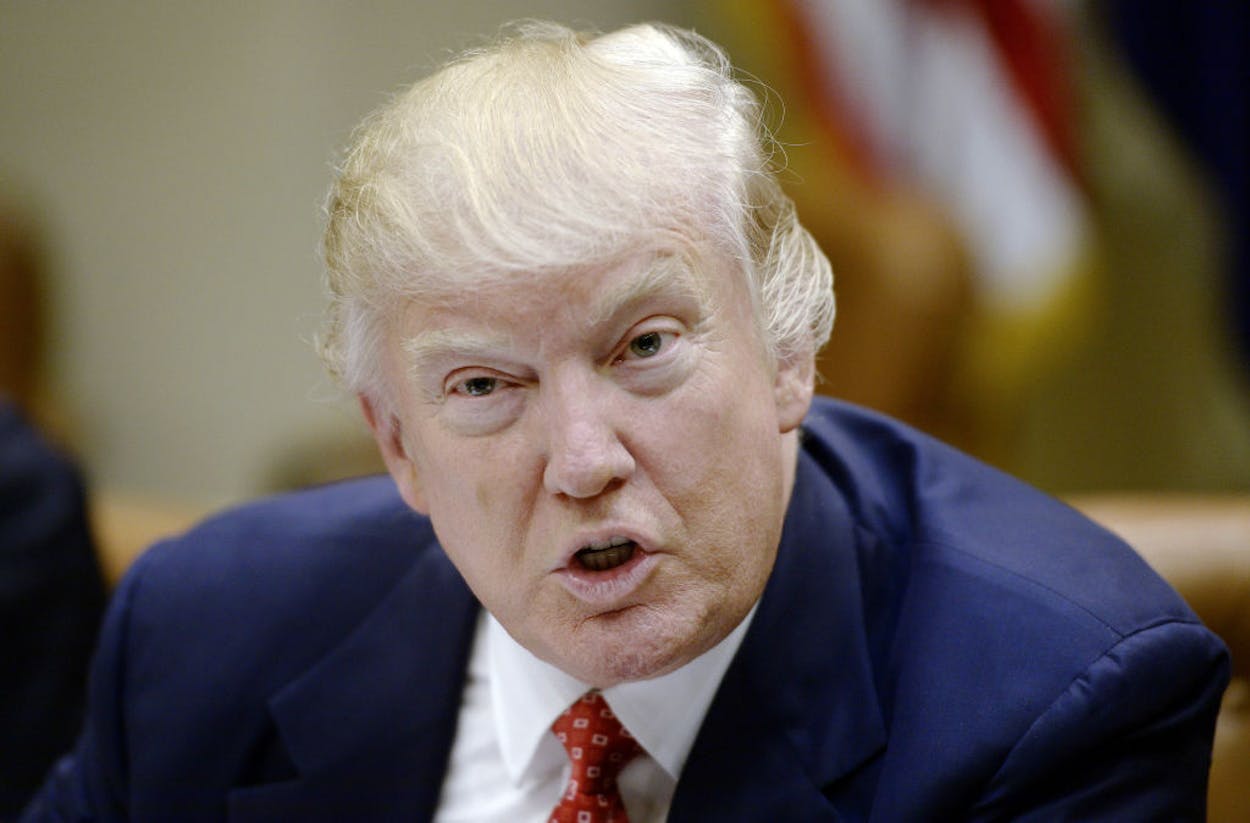Is Donald Trump popular in Texas? Well, that depends. On the face of it, a new poll conducted for the Texas Lyceum shows a majority of Texans disapprove of the job Donald Trump is doing as president. But that’s when you ask all the adults in Texas, those who vote and those who don’t. When you get down to the Republicans—the folks who cast the ballots that gave Trump Texas’s Electoral College votes, he remains popular, with 85 percent support.
The key seems to be which group of Texans you’re talking about. Overall Trump’s disapproval/approval rating among all Texans was 54 percent/42 percent. But while Republicans support him, 86 percent of Democrats disapprove of his job performance, along with 73 percent of the millennials and 61 percent of Hispanics. Sixty percent of whites view Trump positively.
Part one of the poll, found that 61 percent of adult Texans oppose Trump’s proposed border wall. Majorities also said they supported a path to citizenship for undocumented immigrants living in the United States and opposed mass deportation. But if you’ll take a quick look back to my earlier post, you’ll see what a gap there is between adult Texans and Texans who vote. As the poster used to say, Your Vote is Your Voice. And in Texas, many remain silent.
While it is very early in the election cycle, probably some of the most interesting statistics involved Republican U.S. Senator Ted Cruz’s run for reelection next year. At this point, on name identification alone, Cruz should be trouncing all comers, but he is not. The Lyceum survey has to make us wonder whether his brand is damaged.
The survey found Cruz tied with Democratic U.S. Representative Beto O’Rourke, at 30 percent support. And Democratic U.S. Representative Joaquin Castro of San Antonio, who is expected to enter the race sometime soon, is actually leading Cruz by 35 percent to 31 percent. However, a whopping 37 percent of those surveyed have not yet thought about the race.
“Ballot tests conducted this far in advance of an actual election are, at best, useful in gauging the potential weaknesses of incumbents seeking reelection,” wrote pollster Daron Shaw. “But the substantial percentage of undecided respondents—coupled with the conservative pro-Republican proclivities of the Texas electorate in recent years suggest a cautious interpretation.”
Cruz was very popular with hard-core conservatives when he ran for president last year, but during his tenure in the Senate he alienated moderate Republicans and Democrats by once leading a government shutdown. Then he further damaged himself in his presidential race last year when he waffled on endorsing Trump by name after Trump secured the Republican nomination. The Texas Lyceum numbers may give Democrats some hope that they can defeat Cruz, but the poll might also serve as a lure to a Republican thinking about challenging Cruz in the primary.
The survey was good news for Governor Greg Abbott, who had high marks from 53 percent of the state’s adults, including 82 percent of the Republicans, half of whom said they “strongly approve” of his job as governor. Abbott also had a plurality of support from Hispanics. Forty-nine percent of the Hispanics surveyed said they approved of Abbott, while just 34 percent disapproved.
Overall, a plurality of Texans—43 percent—believe the North American Free Trade Agreement has been good for the state’s economy. But NAFTA, once a prime example of Republican orthodoxy, has fallen out of favor with GOP voters. A 2009 Lyceum survey found 41 percent of the Republicans said NAFTA had been good for the state economy. Now, only a quarter of the Republicans said NAFTA has been good for the economy, while 37 percent said it has been bad.






